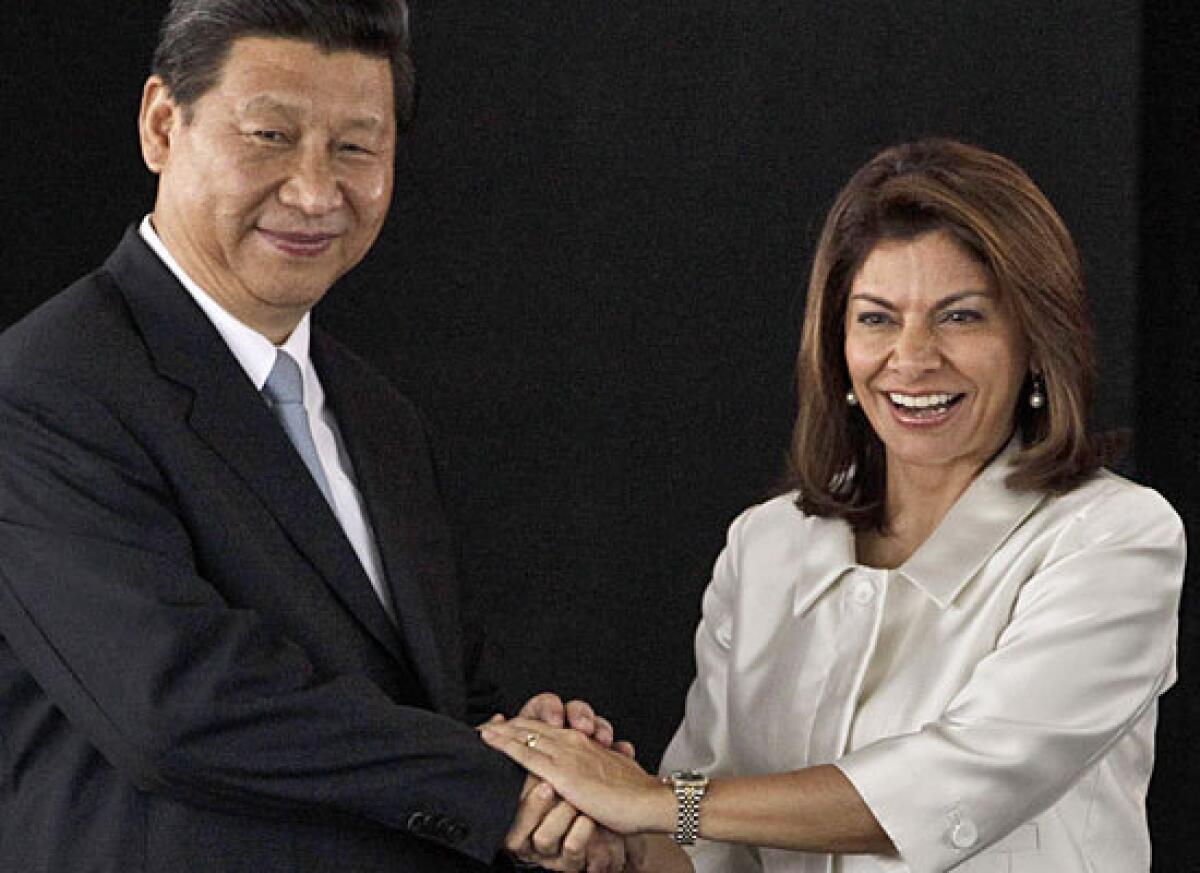China on a charm offensive

- Share via
BEIJING — Chinese President Xi Jinping nibbled on empanadas at the home of a Costa Rican coffee farmer. His wife played the steel drums in Trinidad and Tobago.
With smiles and, of course, money, China is on an unusual charm offensive to win the love it thinks should accompany the country’s economic rise. The trip that will culminate with a summit in Rancho Mirage with President Obama is part of a concerted effort by the new Chinese government to enhance its world power status.
“The Chinese are well aware that they have an image problem abroad so they’ve taken this diplomatic offense to enhance their ‘soft’ power,” said Mario Esteban, an expert in China’s activities in Latin America at the Autonomous University of Madrid.
And where better to do it than the backyard of the United States?
Hardly any Chinese have heard of Trinidad and Tobago, but Xi and his singer wife, Peng Liyuan, lavished the nation of 1.3 million with a three-day visit. It was a deliberate calculation for Xi to touch down in the Caribbean before his two-day summit with Obama, which begins Friday.
Using the checkbook diplomacy for which it is famous in Africa, China made sure the money flowed freely. The Chinese pledged to fund a children’s hospital. Then came $3 billion in concessionary loans for 10 Caribbean countries, whose leaders flew in to meet with Xi.
In Costa Rica, the Chinese announced $2 billion in deals ranging from the upgrade of a refinery to a new highway. And in Mexico, Xi was greeted Tuesday with full military honors and a declaration from President Enrique Peña Nieto: “Mexico and China are two countries ascending within a new international order.” The Chinese leader gave a formal address to Mexican lawmakers Wednesday.
The Costa Rican visit sent a message to the countries that, unlike Xi’s host, still recognize Taiwan rather than the People’s Republic of China; 11 of the 21 happen to be in Latin America.
“Costa Rica has to be a showcase for Beijing,” Esteban said. “They want to say if you have relations with us, you’ll develop faster.”
But Xi’s tour has had less to do with Taiwan, which under its current government has warm relations with Beijing, than the United States. Given the Obama administration’s declaration that it is “pivoting” its attention toward Asia, it makes sense for China to cast its gaze at Latin America.
According to a report published last year by Inter-American Dialogue, a Washington-based think tank, China has made $75 billion in loan commitments in Latin America since 2005.
“As China is growing stronger, we have to behave like a big nation. It is an important strategic decision,” said Wang Ping, an expert in Latin American affairs at Tianjin’s Nankai University.
Back in Asia, China has increasingly abrasive relations with many of its neighbors, clashing with Japan, the Philippines and Vietnam in part over competing claims to various islands in the East China and South China seas. All three nations have turned to the United States for support. In fact, China appears to be more popular in Latin America — with the exception of some strains with Mexico, which is trying to narrow its trade gap with the Asian giant.
“China’s situation is not very favorable for its long-term interests. Because of their growing assertiveness, everybody around them is ganging up with the U.S. behind them,” said Chong-pin Lin, a former deputy defense minister in Taiwan. “That is what they are trying correct.”
Xi, 59, who ascended to the presidency in mid-March, looks poised to become the most widely traveled Chinese leader. In barely 100 days in office, he has been to Russia, Tanzania, South Africa and Congo, in addition to the current trip. At home, he’s received senior leaders from 28 countries.
Chinese state-controlled television has accorded the trips lavish coverage, broadcasting lengthy, barely edited footage of the president sampling foreign delicacies and greeting predictably enthusiastic children.
Shi Yinhong, an international relations expert at People’s University in Beijing, says the diplomatic offensive is also directed at the domestic audience in China.
“Giving this government a bigger global presence is critical to achieve stability at home. Doing business internationally like this is compatible with the ‘Chinese dream,’” said Shi, referring to a slogan popularized by Xi.
As for the allegations of checkbook diplomacy, he adds: “Showing money is a traditional Chinese diplomatic style.”
Times staff writer Tracy Wilkinson in Mexico City contributed to this report.
More to Read
Sign up for Essential California
The most important California stories and recommendations in your inbox every morning.
You may occasionally receive promotional content from the Los Angeles Times.










